WPBeginner is a WordPress.org resource site, so naturally, we recommend using WordPress.org over other platforms. That’s because we’ve seen how its flexibility and features help users (and ourselves) build exactly the website they want, without limitations.
If you’re new to WordPress, it might not be clear how WordPress.org compares to WordPress.com. Don’t get us wrong – WordPress.com has its benefits, like easier setup and included hosting. For simple personal blogs or hobby sites, it can be a good starting point.
But to help you make the right choice based on your specific situation, we’ll explain the key limitations of WordPress.com and compare them with WordPress.org’s capabilities. This way, you can make an informed decision about which platform best suits your needs.
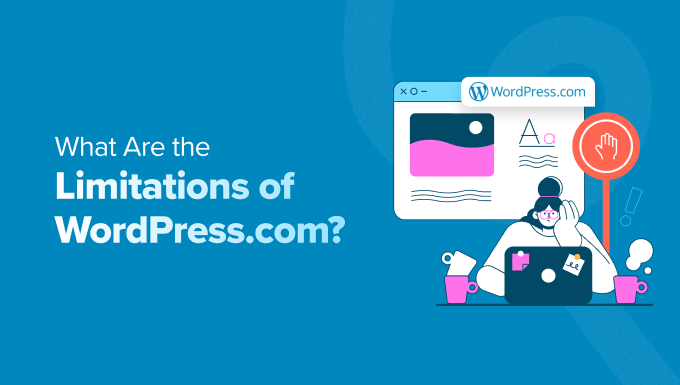
🚨 Want the flexibility of WordPress.org with a hands-off setup? WPBeginner Pro Services can do that for you. Skip the hard work and let our expert team create your site, optimize it for search, and speed up its performance.
Book a FREE Consultation with WPBeginner Pro Services Today!
An Overview of WordPress.com vs. WordPress.org
Before we start, let’s review the key differences between WordPress.org and WordPress.com.
WordPress.org is an open-source content management system (CMS), which is a type of software used to build websites.
Open-source means the software is freely available for anyone to download and modify.
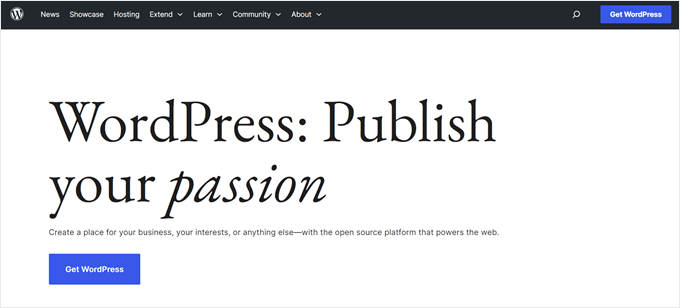
While WordPress.org itself is free, you will need to pay for hosting and a domain name to start a website on this platform. That’s why WordPress.org is also often called self-hosted WordPress.
On the other hand, WordPress.com is a website builder that’s based on the same WordPress software as WordPress.org. It is run by Automattic, the company founded by WordPress founder Matt Mullenwegg.
With WordPress.com, users don’t need to find their own hosting plan and install the software themselves. They can choose a free plan or one of the available paid plans, and Automattic will host their website for them.
Expert Tip: If you buy a paid WordPress.com plan using our coupon code WPB50, you’ll get 50% off your first year!
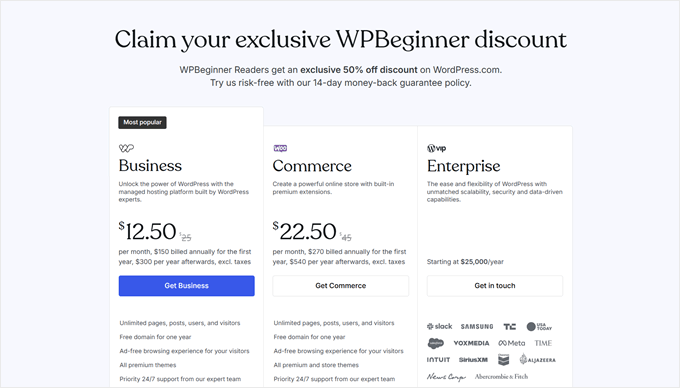
For beginner WordPress bloggers, having your hosting taken care of might seem like a more convenient option. But in reality, there are actually some drawbacks that you should consider.
Let’s go through the limitations and disadvantages of WordPress.com one by one. You can use these quick links to skip to a specific topic:
1. Limited Access to WordPress Plugins
Whether you use WordPress.com or WordPress.org, the core software only allows you to create a simple personal blog or website. That means you can only write content, add images, publish your pages or posts, and that’s it.
There are no built-in tools to do special things, like add a contact form or sell online. If you want to use these features, then you will need to install a WordPress plugin, which is like an app that extends the WordPress software.
In WordPress.org, you get access to 59,000+ free plugins for various functions. You can install a page builder to get more customization options for your web design or a Google Analytics plugin to track your site performance.
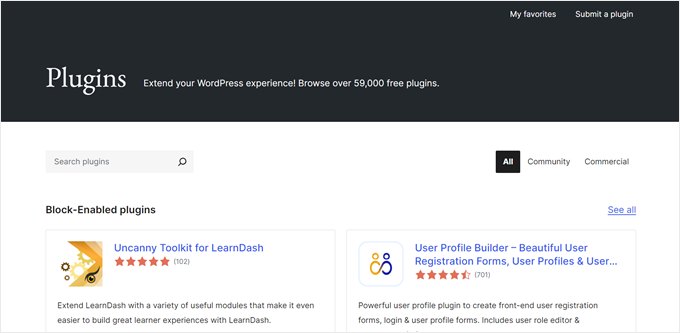
These plugins are what turned WordPress from a simple blogging platform to a powerful and widely used website builder.
Meanwhile, WordPress.com users have limited access to these free plugins. For starters, you need to have a Business plan or higher to be able to install them. The plan itself costs $25 per month, which is pretty pricey to begin with.
You also cannot install third-party premium plugins unless you have a Business plan or higher.
If you use WordPress.org, then you can install any free or premium plugin, no matter what. And if you use a hosting provider like Bluehost, then you can even get some must-have WordPress plugins pre-installed so that you can use them right away.

The best part is that Bluehost’s cheapest plans are much more affordable than WordPress.com’s Business plan. They’ve also offered an exclusive discount for WPBeginner readers so that you can save even more money!
2. Limited Access to WordPress Themes
WordPress themes are ready-to-use template files that users can install to design their websites. This way, you won’t need any coding or design skills to make your site look good.
With WordPress.org, you will have the freedom to pick from more than 11,000 free themes or install a premium theme of your choice.
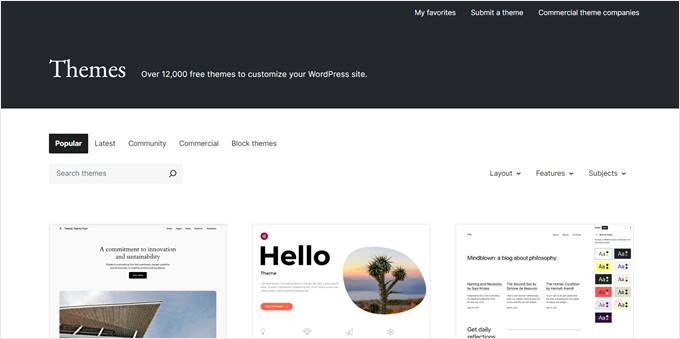
However, just like with plugins, WordPress.com users’ access to theme options is limited. While Free plan and Personal plan users can use free themes, premium and third-party custom themes are only available for Premium plan users or higher.
In other words, besides the cost of the premium theme, you will also have to pay $8 per month or more to be able to install it.
Of course, the 11,000+ free themes available are great. But often, premium themes come with advanced features, like more customization options and unique designs.
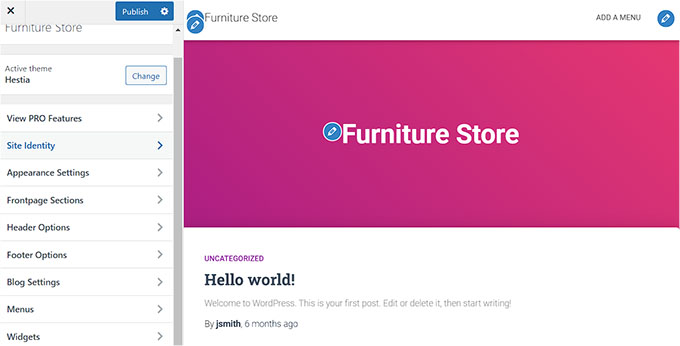
Even if you know how to style your theme using CSS, you cannot do so with WordPress.com unless you have a Premium plan or higher.
3. Limited eCommerce Features
Online store features in WordPress.com are only available if you buy the Commerce plan or higher.
This plan costs $45 per month and includes features like premium store themes, inventory management, unlimited products, and a 0% commission fee.
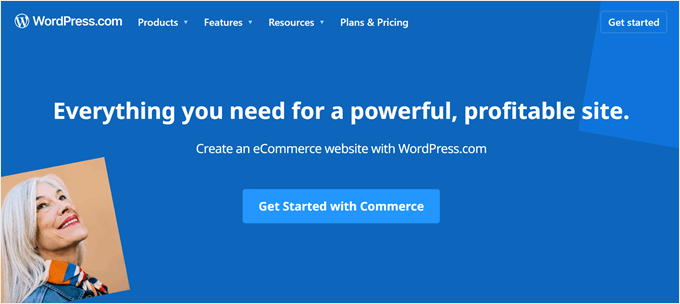
For small business owners, this price tag can feel a bit steep, especially when compared to WordPress.org.
On WordPress.org, you can install the free WooCommerce plugin to sell online. Then, you can sell multiple physical and digital products, get your storefront pages running, and enable online payment methods.

If you need more features, then there are tons of free and premium WooCommerce plugins available to extend the core WooCommerce plugin. This way, you can buy and use the tools you truly need to maximize your small business budget.
4. Limited SEO Features
Search engine optimization (SEO) is one of the most important marketing tactics for getting more traffic to your website. Both WordPress.com and WordPress.org have features that make optimizing your content for search engines easy.
For example, both platforms include heading tags in the block editor. You can use these to create structure in your pages or posts and help search engines and users navigate your content.
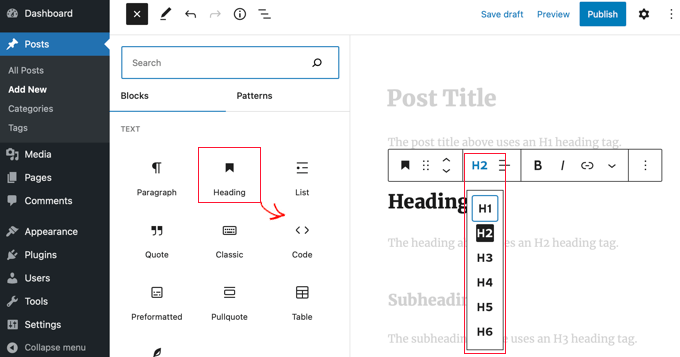
They also have an alt text editor to provide more context to images. Search engines use this information to understand what the image is about. Screen readers also read the text out loud to visually impaired users when they are browsing the web.
What makes WordPress.com and WordPress.org different is the access to SEO plugins.
On WordPress.org, you can easily install a plugin like All in One SEO to get more SEO control. Some of this plugin’s features include the meta title and description editor, on-page content suggestions, an internal linking assistant, and so on.
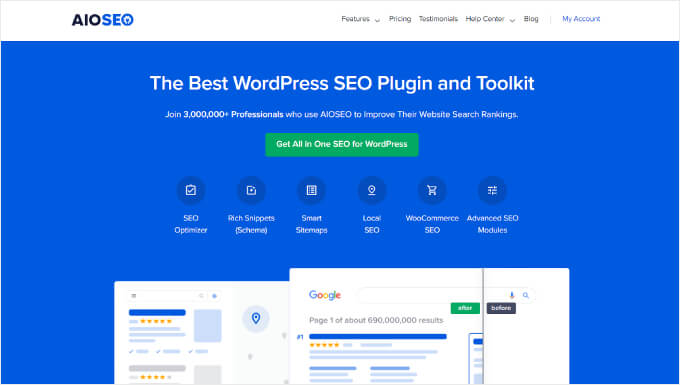
Meanwhile, you can’t get access to those features if you are a free WordPress.com user. You will need the Business plan ($25 per month) to use Jetpack’s SEO tools and install an SEO plugin.
This makes it pretty hard to optimize your content and do technical SEO, especially if you have a limited budget.
That said, all WordPress.com plans have an integrated Jetpack AI Assistant, which gives 20 free requests to check mistakes in your WordPress blog posts. However, the feedback won’t be specifically related to SEO.
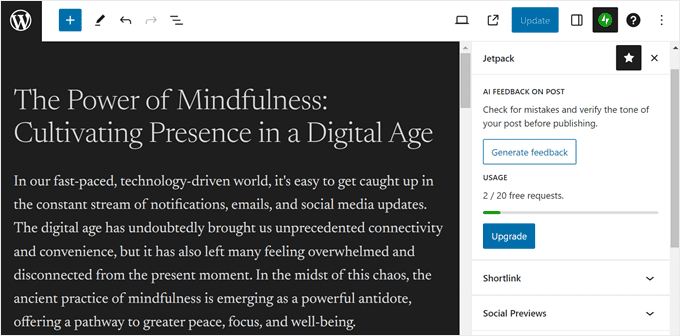
You can also see stats via Jetpack to evaluate your website performance. Still, it’s not as in-depth as using a Google Analytics plugin like MonsterInsights.
5. Limited Monetization Options
Monetization in WordPress.com has improved over the years, but it still has some drawbacks if you are looking to make money from your website.
Today, all WordPress.com plans allow donations, tips, payment buttons, paid content gating, and paid subscribers. These options are great if you are a content creator who wants to offer members-only perks on your site.
That said, you can only accept PayPal payments if you are on a Personal plan or higher. PayPal is one of the most widely used payment methods on the internet, so not using it can make you miss out on potential sales.
Plus, WordAds (WordPress’s advertisement program) is only available for Premium users or higher.
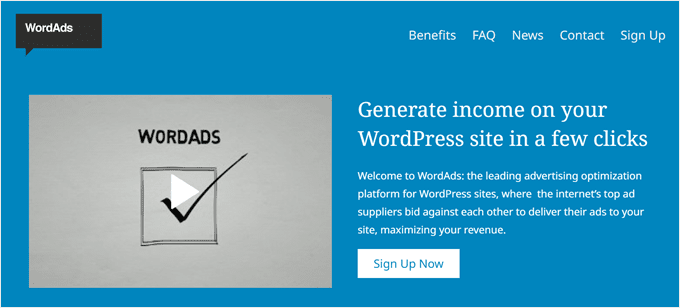
What’s more, WordPress.com takes commission fees from your payments, which lowers your profits. The rate ranges from 0% to 10%, and the cheaper your plan, the higher the fees.
On the other hand, WordPress.org puts no limit on how you make money on your blog or website. As a result, you can have full control over your revenue.
You can also join any advertising platform or use any online payment provider you want. Here are some guides on how to do that:
- How to Sell Ads on Your WordPress Blog (Step by Step)
- How to Properly Add Google AdSense to Your WordPress Site
- How to Add Amazon Ads to Your WordPress Site
6. Possible Website Suspension (Without Warning)
Speaking of limited monetization, WordPress.com may also take down your site if you don’t follow their terms of service for advertising, among other things.
The other rules are pretty standard, such as avoiding spam and illegal activities. However, some users have reported unexpected suspensions without warning.
Here is what their user guidelines say: “Bear in mind that these are just guidelines — interpretations are solely up to us. These guidelines are not exhaustive and are subject to change.”
On the other hand, WordPress.org doesn’t have such specific terms or guidelines. Since it’s free software, the policies depend on the hosting provider and server configuration. This offers users more flexibility, but you do need to comply with your host’s rules.
7. Limited Branding Opportunities
Another limitation of WordPress.com is you don’t have complete control over your website’s branding.
You can customize your site’s appearance to some extent, including changing the color scheme, adding a custom logo, and customizing the site’s layout.
However, for Free and Personal plans, the level of customization is limited. Depending on how you change the theme’s style, you may get a notification that you are using a premium style and have to upgrade to use it.
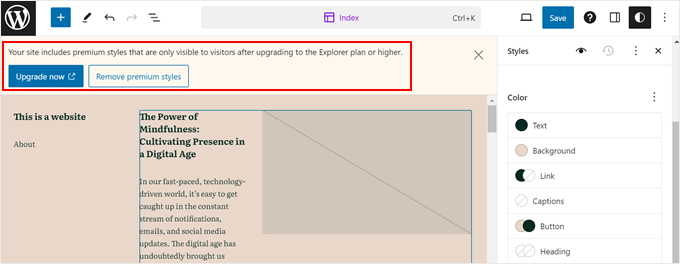
What’s more, if you use the free WordPress.com plan, then you will have WordPress.com ads displayed on your website.
On WordPress.org, you have much more flexibility in branding your site, and you won’t have any ads shown on your website unless you put them there.
Plus, you can use and customize any theme available. If you want more customization options, then you can just install a page builder plugin like SeedProd.
One perk of WordPress.com is it still allows the use of a custom domain name in all plans. Paid plans also come with a free domain name for one year. However, this feature is not something new, especially since many WordPress hosting providers like Bluehost offer it, too.
8. Limited Performance and Security
Like many other website builders, WordPress.com offers several plans that you can purchase as you build your business. What’s tricky is that certain security and performance features are only available if you upgrade to a specific plan.
For example, only Business and Commerce users can use Jetpack’s real-time backup and uptime monitoring features. These tools can help ensure that your site is available at all times, and you can restore it in case a disaster strikes.
Users with lower-tier plans cannot use these features. They can’t install their own backup plugins to enable them, either.
Plans below Business also don’t include a web application firewall, which is a basic security feature that most major web hosting providers offer.
Many people choose self-hosted WordPress.org to avoid these problems. With it, they can choose a hosting platform and buy a hosting plan with the storage space, bandwidth, and other resources that suit their needs best.
If the hosting service doesn’t include certain tools like backups, then the user can freely install a plugin like Duplicator to enable it.
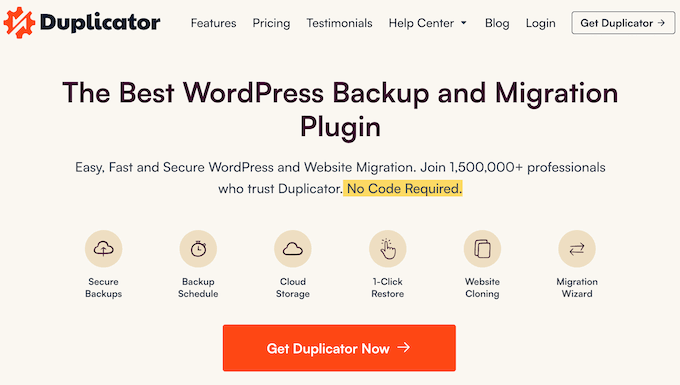
These reasons make WordPress.org a much more scalable option than WordPress.com, especially for an online business.
When Should You Use WordPress.com Instead of WordPress.org?
In most cases, we recommend using WordPress.org instead of WordPress.com. That being said, based on our experience, WordPress.com could be suitable if:
- You want to create a free blog with a WordPress.com subdomain – If you are just running a personal blog and have no intention of branding it, then a free WordPress.com website could be a good option.
- You want a no-frills solution to run a simple blog or website – In this case, you may not need any third-party plugins and would be happy with the Free, Personal, or Premium plan.
- You are a content creator or online business owner who wants to use an all-in-one website-building solution – WordPress.com’s Business and Commerce plans can be suitable as they are already tailored to these use cases.
- You need direct WordPress support – With WordPress.org, the help you get often comes from community forums, blogs like WPBeginner, or theme or plugin developers. If you are a paid WordPress.com user, then you can get direct email or live chat support.
How to Move From WordPress.com to WordPress.org
While WordPress.com is good for certain types of users, many WordPress.org hosting providers offer solutions that have made this open-source platform much easier to use.
For example, hosting services like Bluehost, Hostinger, and SiteGround include a one-click WordPress installer. This way, you won’t need to set up the platform manually. Just click a few buttons, and you can log in to WordPress right away.
What’s more, they also offer pre-installed free plugins, so you won’t have to find plugins on your own. For instance, Bluehost’s WordPress installation includes OptinMonster and WPForms, which are must-have WordPress plugins to grow your website.
On top of that, many WordPress hosting providers offer plans that are more affordable than WordPress.com’s Personal plan, which costs $4 per month.
The best part is that WordPress.org doesn’t restrict how you make money from your site or the plugins you can install on your WordPress account. This gives you full control over the activities and growth of your business.
If you already have a WordPress.com site but aren’t satisfied with it, then you can migrate it to WordPress.org easily. You can read our step-by-step guide on how to move your blog from WordPress.com to WordPress.org.
Alternatively, check out WPBeginner’s free blog setup service. This allows you to buy a hosting plan from one of our trusted hosting partners, and in exchange, we will move your WordPress.com blog for free.
See How WordPress.org Stacks Up Against the Competition
Want to see how WordPress.org compares to other popular website builders? We’ve got you covered. Check out these in-depth articles that explore the pros and cons of each platform to help you make the best decision for your website:
- WordPress vs Google Sites – Which One Is Better?
- WordPress vs Ghost – Which Is the Better Blogging Platform?
- WordPress vs. Blogger – Which One Is Better? (Pros and Cons)
- WordPress vs Joomla vs Drupal – Which One is Better?
- WordPress vs. Medium – Which One is Better? (Pros and Cons)
- WordPress vs Weebly – Which Is Better? (Comparison)
- Webflow vs WordPress – Which One is Better? (Comparison)
- Wix vs WordPress – Which One is Better? (Pros and Cons)
- Squarespace vs WordPress – Which Is Better? (Pros and Cons)
We hope this article helped you learn what the limitations of WordPress.com are. You may also be interested in our guide on Shopify vs WooCommerce and our article on how to get WordPress.com features on self-hosted WordPress.
If you liked this article, then please subscribe to our YouTube Channel for WordPress video tutorials. You can also find us on Twitter and Facebook.





kzain
I was wondering what are some common problems I can face when migrating from WordPress.com to WordPress.org, and how these can be best managed.
WPBeginner Support
The most common point of confusion is if you have a domain name, if you do not change where the domain is pointing it will continue to show the WordPress.com site. For how to transfer your site we would recommend taking a look at our article below!
https://www.wpbeginner.com/wp-tutorials/how-to-properly-move-your-blog-from-wordpress-com-to-wordpress-org/
Admin
Dennis Muthomi
I have been a WordPress.com user back then, and YEP! its very very limitated.
The main one is LIMITED access to themes and plugins which severely limited my ability to customize my site.
ANd that made to move over to WordPress.org.
The freedom to choose from thousands of themes and plugins on WordPress.org has been a game-changer for my website design and site functionality.
Chris
WordPress itself does not make the difference between WordPress.org and WordPress.com clear. Thanks for this illuminating article.
WPBeginner Support
You’re welcome!
Admin
Hajjalah
Surely, WordPress.com has very many limitations. The biggest challenge is limited themes and plugins which limit the possibility of desired customization and website design. I personally had to quit and migrate to WordPress.org and indeed from my end, WordPress.org themes and plugins customization provide the greatest experience for website designing.
Mrteesurez
There limitations are not entirely new to me as I have used WP.com for couples of years before switching to Wp.org.
Let talk only one SEO, how many time have you search and see WP.com sites used by professional business, No.
Unless you upgrade which is even expensive, you can not have your own domain or use SEO plugin to optimize your site, so you will free traffic from search engines.
Jiří Vaněk
You’ve described it very accurately. While you can work around various limitations and adapt your website, this is a key issue that can truly limit a website’s potential. I can’t imagine not being able to use plugins like AIO SEO or, even worse, my own domain. SEO is crucial for anyone who wants to be visible online, and I think WordPress.com understands this very well, which is why they have structured their pricing and plans the way they have. They know that many users will be pushed to upgrade to higher plans. This is one reason I’ve never gotten used to using WordPress.com. I prefer the freedom that the .org version offers. The ability to choose any hosting plan or even run my own server is a huge benefit of WordPress.org.
Isabelle
Can I convert from .org to .com?
WPBeginner Support
Yes you can, we have our guide below with how to easily do this
https://www.wpbeginner.com/wp-tutorials/how-to-properly-move-your-blog-from-wordpress-com-to-wordpress-org/
Admin
Jiří Vaněk
I’ve always used WordPress.org on my own hosting or server and actually never thought about the limitations of wordpress.com. However, I have been asked a few times if this is a good hosting option for WordPress. I couldn’t answer because I didn’t know the limits. Now yes. Thanks for the clear list, it really comes in handy.
WPBeginner Support
You can upload pictures to a WordPress.com site but you would want to reach out to their support for any current limitations.
Admin
Heidi Jasper
So, I’ve read over the info on WordPress.Org and WordPress.Com, on differences between blog sharing companies, and all these comments and I still have questions….on WordPress.com can I upload my own pictures for a Gardening Blog? Are there limits to the number of blogs I post or pictures I upload?
Steve Walker
I really think this article needs a bit of an update. WordPress.com has a free tier and multiple paid tiers where many, if not all, of the things you cannot do in the free tier can be done. WordPress.org is the source of the software for self-hosted sites, but for those new to WP, managing hosting and configuration might be more than they are looking for. I use both self-hosted and WordPress.com Business tier and 99% of the time there is no difference except the peace of mind that somebody is optimizing the infrastructure versus doing it myself.
WPBeginner Support
We can certainly take a look at this article, for our more current comparison you could take a look at our article here:
https://www.wpbeginner.com/beginners-guide/self-hosted-wordpress-org-vs-free-wordpress-com-infograph/
Not all sites require managed hosting, there’s also the option for shared hosting
Admin
Michael
I have signed up to a personal plan at Wordpress.org but through my personal account. I have 2 sites now, one that is free and is just used for personal blogging and suits my purposes fine. The other one however which i am currently in the process of setting up is for business purposes. I am starting to get the feeling though that I have been scammed, not intentionally scammed but just certain details omitted at the signup stage like how many pages you can have with a personal website? Currently in my editor it shows all the buttons for pages but I seem to only be able to navigate to Home and Blog in the customising editor but in the site editor I am able to navigate to all the pages i have created?? Its really weird and I have to say I am not very fond of the editor interface, Why couldn’t they just combine the customising editor into the site editor like google does, so much easier and straight forward to understand?
Tyler
Testing shows automating blog posts also has a limitation, it looked like i hit a terms of service, it removed the subdomain.wordpress.com and I have to say my test was very insightful. Thanks for the blog mate. It’s a hard topic to discuss the complexities of wordpress ownership & the slap on the wrist that is swapping from free version to your own personal hosted solution.
Robin
It’s possible to switch from your free WordPress blog to wordpress.org’s software, yeah?
WPBeginner Support
Hi Robin,
Yes, see our step by step tutorial on how to move from WordPress.com to WordPress.org.
Admin
Mary Connor
I want a personal record of my travels for friends and family. That’s all. No money, no ads, no paypal or buttons.
Can I write about and add multiple photos in a single posting?
Cheryl Ahlquist
Is my use of a free wordpress.com blog site limited to a certain number of years or to a limited amount of space used on my site? I would like to continue to indefinitely use the free wordpress option if possible.
OT
Hi ! I already decide wordpress.org but i am a 0 about codes and maintenance is my biggest question. When you talk about maintenance what it is mean.
WPBeginner Support
Hi OT,
It means that you will have to install updates when they are available. You will see a notification in WordPress admin area that updates are available and you just need to click on update to install them. You will also need to setup a backup plugin to automatically backup your WordPress site.
Admin
shiq4
I want ask one question, is it fine to offering a page for my own service such as content writer’s page?
Leigh
One of the things that is never mentioned in using WP.com is that it has excellent security and a very strong fire wall to protect your site/blog from hackers.
Our site (which publishes global news on human rights issues around the world) actually moved from a very developed WP.org platform back over to WP.com this last year. WP.com was actually the original platform we used over a decade ago. But after we grew to a site that had over 105,000 impressions per day we also started having an ongoing assault of global hackers trying to get into our site. This required more and more security on our end….with more more cost and effort in hiring the right security experts. We also had many more hassles. Along with all of this we had numerous times when our WP.org site went offline due to hackster attempts. Wordpress.com is much more safe for any of you wanting this with your site/blog.
WPBeginner Support
You should have given Sucuri a try. We use it on all our WordPress sites.
Admin
Leigh
Hi There – Our past experience is with a great app that is used by many people on WP.org called Bullet Proof Security (we used the Pro version) and we did work closely with Edward Alexander the creater of this program. While this is probably one of the best, it also requires alot of tech (knowlede) based management and troubleshooting when php, .htacess and other actionable code needs tweeking when hackers efforts are present. Going over to WP.com made the process with security a no time, no problem, no effor processt. Thanks again for provinding this forum to discuss this important topic. : )
Mr Free account
I have been building web-site for many year and had a look at worldpress.com using a free account and did not think much too it.
Yes i can upload one picture to be used on the home page but apart from that they don’t let you upload nuffing and all you can do is embed images that are hosted on remote servers by using the editor and switching to HTML view.
Web-pages are all about pictures and it seems like a waste of time if they won’t provide any space for uploading files even on a free account so i think i will knock it on the head
Velik
I feel scammed. When I signed up for wordpress recently and bought my own domain – around $70 in total, nobody told me that there are TWO types of wordpress :
Wordpress.COM and Wordpress.ORG
You can’t access permalinks, nor add/remove plug-ins on Wordpress.COM . Now I need to buy a new domain and pay $70 more in order to do this….
I feel scammed.
WPBeginner Support
You don’t need to buy a new domain name. You can use your custom domain at WordPress.com with your new self-hosted WordPress site. Take a look at our free blog setup service if you need more help.
Admin
Alana
This is a very resourceful article that can help many people. Last week I purchased my domain (premium) on wordpress.com and feel scammed because I didn’t realize that I cannot add advertising, plugins, and that I earn through wordads by US based traffic only coming to my page.
Now I am making my plan to move over to wordpress.org because my whole intention was to build my brand, focus on product reviews, airlines, and hotels that I have used that I trust. I cannot do this with wordpress.com. I have thirty days to claim my refund………
Amanda
Hello Editorial Staff,
I know Wordpress.org would be ideal for my needs as I would like to have a blog about my craft projects and then be able to sell them, but currently do not have the income to spare to pay for a self-hosted website though Bluehost.
You said to Widdershins that they can put a paypal button for their book. Can I do the same for multiple items or just one or two till I can switch to a self-hosted website?
Thank you,
Amanda
WPBeginner Support
It is not a good solution, but you can do that.
Admin
M Obrien
If I decide blogging is not for me can i remove my blog?
WPBeginner Support
Yes you can.
Admin
M.A.
I have been using WordPress.com for over a year now, and just this week, I am having trouble downloading pictures to my blogs? Is there ever a maximum # of blogs/pics I can post before it is full? Please help.
WPBeginner Staff
Please contact WordPress.com support.
Darrell Wolfe
And THAT is the reason I went from Wordpress.Com (even though I liked all of those features they do have and it’s technically easier to use) to Blogger.Com because I want to make money on my blog before paying to use a blog.
Will Word-press ever lighten up on this monetization policy? It seems like they’d be loosing money by blocking monetization and Affiliate links? How am I supposed to learn to use their service and upgrade if I can’t use their service first? It seemed very elitist. Like they didn’t want me on their services?
So why do they put all these blocks on?
Darrell Wolfe
KathyE
I’m interested in creating a website that includes a blog, but is not ‘blog-driven’ . We are an art gallery. Is Wordpress.com or is Wordpress.org more appropriate. Thanks.
Editorial Staff
Definitely WordPress.org
Admin
Dawn Oviedo
So if I register my domain to own it… Can I bring it with me to Wordpress.org? What is the minimum traffic needed to be considered for Wordads?
Thx
Editorial Staff
Yes you can bring your domain over to WordPress.org. Requirement for WordAds have changed, and they no longer reveal the minimum traffic.
Admin
Geoff
Everything you say about not being able to upload themes is correct, but it makes the situation sound a little more dire than it is. There are still over 200 themes (50 being premium) and they seem to add a couple more every week.
Many of these themes have very nice visual customisation options, even if you don’t pay for the ‘custom design’ features. If you do pay, you’ll see that they’ve done an excellent job there: Users can create unique colour schemes with a brilliant designer tool, get access to lots of web fonts, and even more through Adobe. The CSS editor is snazzy too, even allowing LESS and Sass to be used.
Of course, if you want to make functional changes you’ll be out of luck.
Editorial Staff
You are correct, there are 200+ themes on WordPress.com. But there are almost 1700 themes for WordPress.org (in the free WP repository). This is not counting tons of commercial themes that are not listed in the repository.
Admin
Geoff
I wasn’t challenging your correctness, just the tone:
> “In any case the theme choice is very limited. Secondly, you can not modify those themes.”
200 themes isn’t really ‘limited’, and you can modify them. Your thesis for this article is totally correct: WP.com has big limitations. Users should know up-front what they want to accomplish. I was just picking at the fact that you made it sound like there were hardly and themes available and that you couldn’t touch them. (without paying for CSS anyway).
Gautam Doddamani
i believe wordpress.com is a great step for whoever wants to take the plunge into the blogging ocean…beginners can analyze and assess themselves if they have what it takes to make their business a professional one…there are many limitations i agree but its great for free blogging!
Adam
But all this info should have been appearing the step before registration not only from this link.
Then the customer will know what he wants. For instance I did register but as I am very new to creating a blog or websites I didn’t know all this and I didn’t understand that my domain which I registered by Wordpress is now stuck 60 days due to a law that doesn’t allow the user to move the domain to a another webhost. This should some go be appearing before payment .
Now I can’t install plugins and have to wait 60 days until I remove my domain
Regards
Adam
Editorial Staff
You can’t transfer your domain, but you should be able to change the nameservers and point it to another location.
Admin
Widdershins
So … I can have an ad for my book – which I have, with links to my publisher … but if I self publish a book, I can’t SELL it FROM my wordpress.com blog … for instance have a paypal ‘buy me’ button for it on my blog … yes? … no? … otherwise?
Editorial Staff
You can add a paypal button on your WordPress.com site.
Admin
Umer Rock
Yes WordPress is very limited… but for beginners it is very best to start their demo WordPress
Rohit
At the price, it does not get cheaper for the reliability they offer. It can be a good starting point for many blogger, who want to experiment with a blog, but on a budget. You can always migrate if your blog grows big.